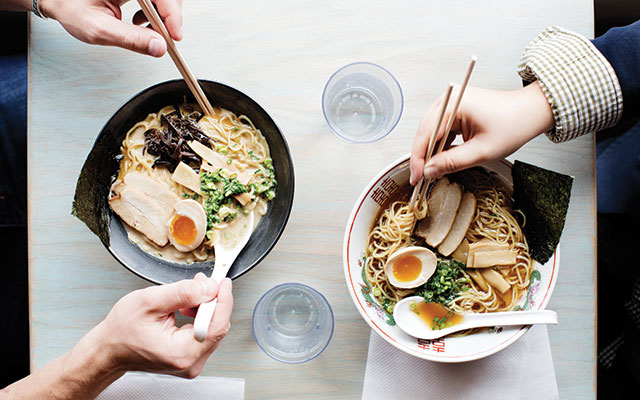Local playwright and blog/columnist Emily Kaye Lazzaro wrote about a recent encounter with an overheard conversation that took her on a journey similar to the Singer’s in We’re Gonna Die. I loved her blog post about how the encounter unfolded, and it feels so of a piece with the work we’re doing in rehearsal. (I highly recommend reading her whole post, which I’ll excerpt below.)
Emily has publicly written several times about her three miscarriages, and her path towards welcoming her son into her family. In her piece “An Open Letter to the Couple Sitting Next to Me at the Ramen Place at 2:45pm on a Thursday” she recounts that while dining solo the other day, she overheard a couple at the next table trying to come to terms with the miscarriage they had clearly just suffered. It threw her back immediately into her own period of suffering:
I heard a few more things that started to confirm my suspicions. Then I heard the woman say, “I do still want to go away with you, though, before we can try again,” and I burst into tears. The tears were the kind that just flow out of your eyes like somebody turned a faucet on, with no accompanying sobs. I was very surprised by the crying! Just like, oop, we are crying now! I think I played off the nose blowing and face wiping by attributing it to the spicy ramen. […]
I guess I cried because I remembered having that conversation. A very sad thing about having a miscarriage is that it’s sort of like finding out you are going to Disney World, buying a plane ticket, reserving a hotel room, and packing your bag, only to discover that Disney World doesn’t exist, never existed. And you have to cancel your plane ticket. And you feel stupid for ever thinking that Disney World did exist.
She continues…
I’m sure you guys will be okay and everything and I’m glad I didn’t talk to you because I was very clearly making your experience about myself. But whatever. Now I’m obviously making it about myself by writing about it on the Internet. My point here is that this shit happens a lot and it’s terrible and I’m sorry. I’m sorry that it happened to you and that it happens to a lot of people all the time. I’m sorry Disney World doesn’t exist right now. But it might exist later, if you try again.
The Disney World metaphor has broken down.
I’m not even sure there’s anything to be learned from having a miscarriage or two or three. I want there to be something to be learned. But it’s probably just like any kind of loss. The thing to be learned is that it happens once and then it continues to happen for the rest of your godforsaken time on this planet and there’s nothing to be done. There is so much loss and so much suffering. But there is also spicy miso ramen.
The exceptionally quotidien nature of suffering — and the feeling that we must be special and so we do not deserve this pain — runs through both Emily’s post and We’re Gonna Die. Horrible things happen all the time.








